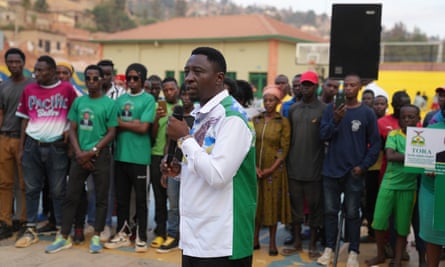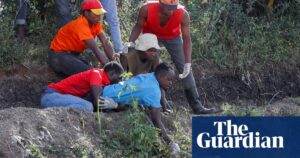People in Rwanda have gone to the polls for elections in which Paul Kagame is widely expected to extend his rule of the central African country.
This is the fourth presidential ballot since more than 800,000 people, mostly members of the Tutsi ethnic minority, were killed in a genocide in the country 30 years ago.
Kagame, who led the Rwandan Patriotic Front rebel group to defeat Hutu extremist forces and end the genocide, was elected president by parliament in 2000 after the resignation of Pasteur Bizimungu.
He has won more than 90% of the vote in the three previous elections since then – in 2003, 2010 and 2017.
Running on the Rwandan Patriotic Front (RPF) ticket, Kagame is seeking a fourth term after a constitutional amendment in 2015 extended presidential term limits.
Kagame is credited with transforming Rwanda from ethnic division to being a united country and regional business hub. But critics accuse his administration of censorship and curtailing human rights in the country of 13 million people, more than 9 million of whom are eligible to vote in Monday’s ballot.
In this election, he faces the same opponents as in 2017: Frank Habineza, of the Democratic Green party of Rwanda, and Philippe Mpayimana, an independent candidate.
Rwanda’s national electoral commission disqualified six others, including vocal Kagame critics Victoire Ingabire, Diane Rwigara and Bernard Ntaganda, for various reasons.
Long lines of voters formed as early as 5am at the polling station at the Remera Catholic primary school in the capital, Kigali, one of five polling stations visited by the Guardian. Voting was taking place peacefully at all the sites. Observers from the African Union were present.
“Kagame has ruled us well and I am going to vote for him again,” said Frank Munyaneza, a driver. “He has brought development and we have security under his rule.”
Kagame’s campaign priorities have included security, stability, unity and economic development.
“We chose to rebuild ourselves and our country, which was destroyed by bad politics and irresponsible leaders,” he said at a rally in the northern Gakenke district on Thursday.
“As for you, you have rebuilt yourselves, you have built your skills, and you have competent leaders at all levels. Therefore, you must do everything possible to ensure that Rwanda continues its path towards sustainable progress.”

Habineza, a former RPF member, is advocating for changes to tax and land policies and for modernisation of agriculture. “We toured the entire country, and wherever we went, people welcomed us warmly. They gave us gifts and assured us they would vote for us,” Habineza said after voting. “We have to maintain this momentum and not regress.”
Mpayimana, a senior expert in the ministry of national unity and civic engagement and a former journalist, is pushing to downsize parliament, increase agricultural productivity, and improve education and student welfare. “We are confident, each of us is confident, it’s half and half,” Mpayimana told journalists after casting his vote.
In the last election, Habineza and Mpayimana each got less than 1% of votes. Analysts say they continue to lack sufficient name recognition, financial resources and organisational ability to significantly challenge Kagame.
RPF has been the ruling party since 1994, and its members occupy 75% of the seats in parliament.
David Kiwuwa, an associate professor of international studies at the University of Nottingham, said: “On the whole, Rwanda is a dominant party system, with RPF occupying a supersized political space and as such in the foreseeable future has no challenger.”
Rachel Nicholson, Rwanda researcher at Amnesty International, said the election could be an “opportune time for political leadership to choose to recommit to human rights” and investigate enforced disappearances, killings and other human rights cases to ensure that victims get justice.
“Regardless of whether leadership changes or not, it’s a moment of change,” she said. “It’s a moment that leaders can choose if they want to.”
Rwandans were also voting on Monday for members of the lower house of parliament.
Polls closed at 3.00 pm (1300 GMT) and counting began immediately, with partial results expected to be released as tallying progresses.
Source: theguardian.com


















